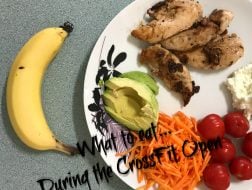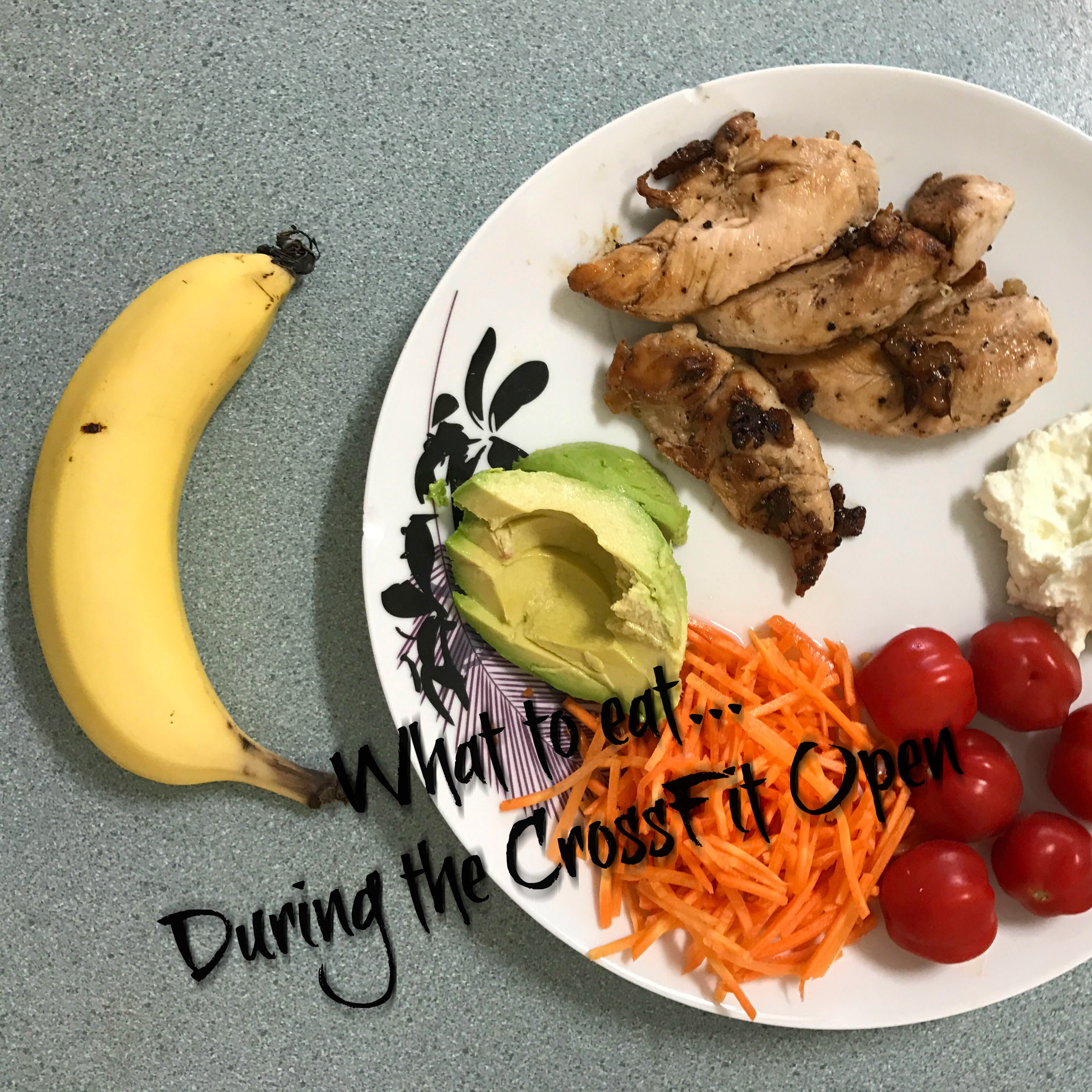What to eat during the CrossFit Open

First of all, if you have been eating well and using your food intake to support your performance, and if what you are doing is working well for you, then there’s no reason to change what you are doing. You will probably still get a few good tips from this post on hydration and recovery, etc., but in general I recommend not drastically changing your diet routine up too much during competition season, if it’s going well for you.
One of my first rules of competition is don’t do anything different or out of the ordinary on the day of your workout. It’s not the right time to experiment with your diet on the day you are doing one of the Open workouts. In saying that, you do have a few days to complete each workout so you can plan your nutrition around the workout.
If you haven’t been eating right, you’ve been eating too much takeaway, not enough food or just having a bit too many unhealthy foods, what I will say is start eating right immediately. This is the single best thing you can do and over the next few weeks if you improve the quality of your food you will definitely see an improvement in performance. Eating to perform is such a valuable concept when you realise the right food is fuel and the wrong foods are land mines. Cut out unnecessary sugar. Cut out the alcohol. Ease up on the fruit as a source of carb fuel, especially during this time, and instead embrace starchy carbs like white rice, oats, potatoes, and quinoa.
Regular intense exercise obviously increases the body’s demands for most everything—particularly nutrients and calories (energy). And while there is not a one-size-fits-all method that works, there are a few rules of thumb backed by science that do apply for the masses when it comes to workout nutrient. Those are the things I am going to focus on today.
You NEED carbs to fuel your workouts
Muscles NEED glycogen for their fuel—and they use a lot of it during CrossFit workouts, especially high intensity ones like Open style workouts. So in light of this, it’s essential to add some extra starchy carbs the day before the workouts (leading up to it) and to replenish your muscle stores with glycogen after you do the workouts at as well.
The preferred primary source of glycogen for high intensity exercise is found in the form of carbohydrates. This is why carbs should be known as “lean muscle builders”—not just “insulin spikers’, “blood-sugar-ruiners” or “fat enhancers”. Nope. carbs, for the very active individual, do the furthest thing from “making you fat.” Instead, they nourish and replenish your muscles after working hard. I do not care what anyone tells you about carbs. They don’t make you put on fat. An excess of calories makes you put on fat. Starchy carbs make you a lean machine if you are staying within your calories overall and if you time them right and manipulate them to get to work for you in fueling your workouts.
The timing of your nutrients is as important as the nutrients themselves. Eating the right kind of carbs in the right amounts at the right time will provide your body with the necessary glycogen stores to fuel you through a workout.
How to work your food & macros around your Open Workouts
The day before your Open Workout:
The day before you do your Open workout I recommend increasing your carbs. I would suggest adding another 100-200g (or more even if you are a big guy) depending on your total calorie intake. You can take this out another day or lessen your carbs the days after the workouts so you don’t have to worry about putting on extra fat as long as you account for these carbs, and they will be put to good use in an Open workout.
I would even suggest doubling your carb intake the day before you do the workout, making sure you have a big chunk of your carbs the night before the workout. You can do this easily in the form of extra starchy carbs and fruit, even an extra shake with added carbs like a banana etc.
The day of your Open Workout:
As far as what to eat before you do the workout will depend on the time of day you will do the workout. If you are doing the workout first thing in the morning, I wouldn’t recommend much about having a big meal right before as this can affect your performance and no one likes training on a full stomach. You can just add a bar and a coffee, or if you are used to just training on an empty stomach, just continue that (although I recommend sipping BCAAs if you train CrossFit on an empty stomach regularly). This is where the carbs from the night before will be put to good use as they will be ready to fuel your muscles.
If you have 1 ½-2 hours before you are doing your Open workout, you can just have a shake or a smaller meal closer to the session. The reason I say smaller is because the closer you get to your workout, the less time there is to digest. That’s why I often recommend something liquid at this time, like a shake or a smoothie.
It could be something like this :
1 scoop protein powder
½ cup spinach leaves
½ banana or ½ cup berries
1 tsp of fats (like mixed nuts, peanutbutter or linseeds etc)
A low-calorie beverage like water, coconut water or unsweetened almond milk, something that you have tried often and that you know doesn’t bother your stomach
If you are training later in the day, say midday, afternoon or evening, I would recommend having a solid meal around 3 hours before you do the WOD, consisting of a protein source like eggs, meat etc., a fat source, veggies and carbs that are denser (this is where you would have your starchy carbs that take a bit longer to digest, things like sweet potatoes, brown rice, etc.) This meal should then be digested right in time to help fuel your performance.
During your Open Workout:
This is up to you of course but seeing as the Open WODs aren’t usually longer than 20minutes and seem to average around 12 minutes and it’s GO TIME I don’t think anything is necessary during your WOD. Have some water and/or electrolyte drinks on hand for before and after though. (See more about hydration below).
Right after your Open Workout:
Immediately after you finish I would recommend getting in a protein shake with around 50g of fast digesting carbs again. This can be a banana, some veggie/sweet potato baby food sachets, or a carb powder mixed in your protein shake like dextrose.
Then you will want to have a solid meal within two hours of your WOD. Again something with a good protein source, some good fats, veggies and some starchy carbs.
The day(s) after your Open Workout
In the day after your WOD (unless you are planning a repeat) this is where you can go lower on the carbs (especially if you are in a deficit in your calories – trying to lose fat). Still have some healthy carbs like veggies of course but you can go lower on the starchy carbs to make up for the extra you had the day before your Open WOD.
This is also the time to work on your recovery so adding in anti-inflammatory foods like bone broths, turmeric, ginger, coconut oil, chia seeds and linseeds, green leafy veggies, blueberries, salmon etc., will all make a big difference in your recovery and help counteract the negative affects from stress hormones that are at an all time high during this time.
Water and Hydration
I would say hydration is the number one greatest nutritional need for supporting exercise and competition efforts. Keeping hydrated every day is the “secret sauce” for energy, power and digestion (of all your other nutrients). This means straight up water. Sports drinks like Gatorade supply your body essentially with sugar—which, post workout is not a horrible thing, but in general you can’t beat straight water. And lots of it during this time.
In addition try this little hack: Every morning drink a cup of warm lemon water with a pinch of Himalayan sea salt in. This promotes balance for your adrenals which take a beating during this time of high stress.
Extra supplements you can add for stress relief and recovery
Magnesium is great to take before bed to enhance your recovery and sleep. I also add in a higher dose of Vit C during the Open season to boost my immune system during this time, which often takes a beating as well due to the extra stress. Zinc & L-Glutamine are excellent for recovery too. Again, don’t experiment too much with new supplements during this time, unless you have tested them before and know how your body responds to them.
Keeping your stress hormones in check
As a CrossFitter your body is more than likely used to stress. Stress is necessary and comes along with competing. That being said, you can use nutrition during this time to support your cortisol balance and adrenal glands (they produce and monitor your cortisol levels).
Cortisol is naturally going to sky rocket during the CrossFit Open. You know that feeling and deep dark place that you have to go during these Open workouts; that pit in your stomach prior to the workout. The adrenaline rush during the workout, and the sudden crash at the end of each workout?! Not to mention the anticipation leading up to each workout. These feelings and rushes that are going to happen anywhere from 5-10 times of the course of each week is the nature of the CrossFit Open and not unavoidable, but this all has a big affect on your stress hormones.
So it’s crucial during the Open to replenish and support your adrenals through good nutrition. Making sure that throughout the week you are getting enough veggies and healthy fats makes a huge difference. Anti-inflammatory foods that I mentioned above are so good to increase during this time.
Another thing to be aware of is to make sure you are eating enough.. Often times athletes will under-eat due to elevated cortisol levels in their bodies, as this tends to decrease their appetite and they don’t realise it. (Do you ever find you lose weight from stress during the Open? I know I have in the past.)
Digestive support will also help keep our hormones healthy and keep our cortisol levels maintained. High cortisol levels impede with the other normal functions of the body, digestion included. I would recommend taking a probiotic and eating high probiotic fermented foods during this time to ward off bad bacteria. Protein digestive enzymes are good too to help break down and move your nutrients quickly throughout your body.
Then of course we have got our non-nutrition related recovery techniques that we should be using as well during this time to help keep our cortisol in check. Things like massage, meditation, foam rolling and stretching, float tanks, relaxing, etc., Everyone de-stresses in different ways and it’s important to find time for this throughout the 5 weeks of the Open.
All in all, what I have suggested today have been general nutrition guidelines for any intelligent athlete like yourself, but extra important during these 5 weeks of higher stress of the CrossFit open. Hopefully you will be able to take a tip or two from here and put it to good use.
Good luck with the Open. I’ll be over here in my corner cheering for you all!
Join the other 10,000+ who get my best fitness, diet & mindset tips.



Comments